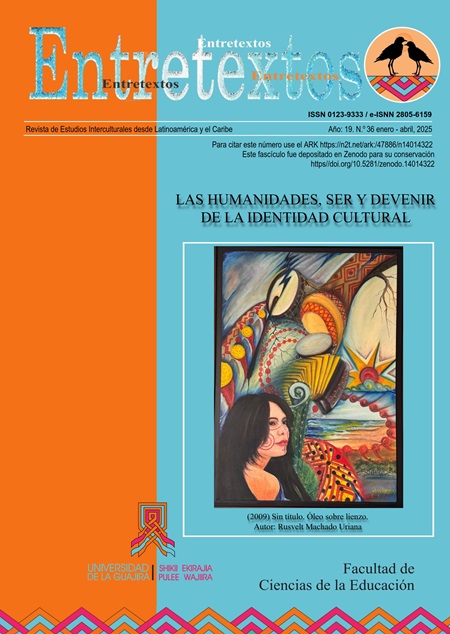Abstract
We aspire to explore intertextuality in contemporary visual culture from Visual Studies. Intertextuality has gone beyond being a tactic, becoming a key characteristic of the image in the 21st century. It will be addressed as an essential semiotic system in visuality and we will propose a theoretical resource accessible to students at intermediate and higher levels. We will start from Benjamin's proposals on the massification of images and we will approach him from Barthes, Baudrillard and Fisher. We will use everyday examples, such as cinema and video games, to facilitate the understanding of intertextuality and its contemporary implications.
References
Barthes, R. (1964). La retórica de la imagen. En Éléments de Sémiologie. Communications.
Barthes, R. (1970). S/Z. Seuil.
Baudrillard, J. (1983). Simulations. Semiotext(e) / Foreign Agent.
Benjamín, W. (2003). La obra de arte en la época de su reproductibilidad técnica. Editorial Itaca.
Benjamín, W. (2004). El autor como productor. Editorial Itaca.
Berger, J. (1977). Ways of Seeing. Penguin Group.
Cabello, F. (2018). El retablo de Isenheim: Religión, arte y medicina. Rev. méd. Chile, 146(9). http://dx.doi.org/10.4067/s0034-98872018000901050
Cobley, P., Jansz, L., & Appignanesi, R. (1998). Introducing semiotics (Reprinted). Icon Books [u.a.].
Deleuze, G., & Guattari, F. (2009). Rizoma. Fontamara.
Everaet-Desmendt, N. (2006). Peirce’s Semiotics. En Signo. Louis Hébert. http://www.signosemio.com/peirce/esthetics.asp.
Fisher, M. (2009). Realismo capitalista: ¿No hay alternativa? O Books.
Fisher, M. (2014). Ghosts of My Life: Writings on Depression, Hauntology and Lost Future. Zero Books.
Foucault, M., & Link, D. (2010). ¿Qué es un autor? El Cuenco de Plata.
González-Vidal, J. C., & Ávila-González, I. (2019). El texto: Una noción problemática. Revista Amauta, 17(34), 17–26.
González-Vidal, J. C., & Ávila-González, I. (2020). El Bautismo y su función en la producción de sentido en El Padrino, de Francis Ford Coppola. En Cultura y Comunicación: Transdiciplinariedad Textual (pp. 79–95). Universidad Michoacana de San Nicolás de Hidalgo.
Guiraud, P. (2017). La Semiologia (13th ed.). Siglo Veintiuno Editores.
Kojima, H., & Fukushima, T. (directores). (1998). Metal Gear Solid. Konami.
Manovich, L. (2001). The language of new media. MIT Press.
Marinkovich, J. (2004). Aproximaciones al análisis intertextual del discurso científico. Revista signos, 33(48), 117–128.
Cabrera, M. (2010). Estudios Visuales. En Pontificia Universidad Javeriana (Ed.), Diccionario del pensamiento alternativo II. Pontificia Universidad Javeriana.
McNabb, D. (2019). Hombre, signo y cosmos: La filosofía de Charles S, Peirce. Fondo de Cultura Económica.
Mertz, E., & Parmentier, R. J. (1985). “Signs” Place in Media Res: Pierce’s Theory of Semiotic Mediation. Academic Press. Inc.
Mirzoeff, N (2009). Introducción a la cultura visual. Routledge.
Saussure, F. de (2005). Course in general linguistics (C. Bally, Ed.; Nachdr.). McGraw-Hill.
Toffler, A. (1990). Thethird wave: The controversal new perspective on tomorrow from the author of Future Shock (Nachdr.). Pan Books.
Travieso, J. M. (2010). RETABLO DE ISENHEIM, un sermón para consolar el padecimiento. Domvs Pvcelae. https://domuspucelae.blogspot.com/2010/05/visita-virtual-el-retablo-de-isenheim.html
Wachovski, L., & Lana, W. (directoras) (1999, 2003). The Matrix Trilogy. Warner Bros.

This work is licensed under a Creative Commons Attribution-NonCommercial-NoDerivatives 4.0 International License.


